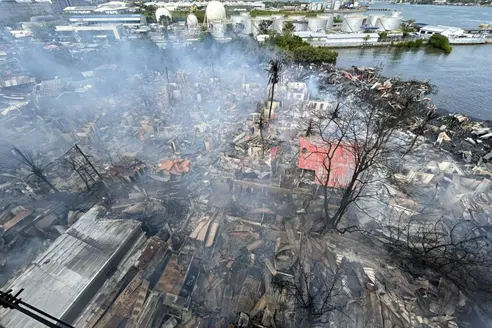Double jeopardy

Last week seems to have been the moment when, after four years of letting things slide, the government decided it could take a political risk by allowing justice to proceed.
The Secretary of Justice last Monday finally announced what everyone had been expecting: the city prosecutor of Davao City’s decision to let Apollo Quiboloy off the hook was overturned. Instead, the prosecutor would have to file charges against the powerful cult leader.
Another case will be filed in Pasig, depriving Quiboloy of a home court advantage. And the Secretary of Justice said that aside from these, two other cases are being investigated by the department. All these cases, the press was told, will be tried in Metro Manila, if the Supreme Court permits.
Quiboloy had a legal double whammy from the time a complaint was filed in Davao—even if dismissed, it was appealed, a ticking time bomb waiting to go off; which is why the Secretary of Justice could make the announcement he did, four years and a change of administrations later—but also when similar complaints prospered in the United States.
There, an indictment was the result, and a warrant issued by the Federal Bureau of Investigation, also in 2020—but only against three Los Angeles-based administrators of Quiboloy’s US operations.
A 2021 superseding indictment added Quiboloy and five others, and his American assets (and those of 40 other individuals), according to Time, were frozen (the superseding indictment lists the pastor’s American homes as being located in Calabasas, California, Las Vegas, Nevada, and Kapolei, Hawaii). When the Palace stopped being anti-American, speculation became rife that it was only a matter of time before Quiboloy would be handed over to Uncle Sam. Proceedings were scheduled to take place on Mar. 19, but Time reports they have been postponed to Nov. 5, “with the U.S. District Court for the Central District of California acknowledging that the case was ‘so unusual and so complex.’”
In retrospect, the mounting alarm of Quiboloy in recent weeks can be attributed precisely to the proceedings looming in mid-March.
At the same time, what became clear were the limits of the solidarity of politicians with Quiboloy, and the limits of the clout of his most powerful friend, former president Rodrigo Duterte. The incumbent President blandly advised Quiboloy to testify before Congress. And both chambers of Congress, in gunning for Quiboloy, have him coming and going: the Senate’s basis are the accusations that have resulted in charges, that of the House, the behavior of his media empire: the Duterte era removed the taboo on using the congressional franchise for broadcast media for political vendetta, which makes Quiboloy’s media fair game.
So Sonshine Media Network International’s (SMNI) ability to defend its principal will be weakened—or put another way, once the legal processes begin to unfold in the courts, the same courts can cite the network or its anchors or talents in contempt if their language becomes too strong. Nor can the network or its talents or anchors hope to thrive in the media landscape once considered to be beyond the reach of government: precisely in the online arena, cyberlibel is already being considered as an offense with which to charge Quiboloy himself.
As it is, Quiboloy, in hiding, has refused to obey subpoenas from the Senate and the House, and while the Senate may feel vindicated by the Department of Justice’s announcement, the House is still threatening the cancelation of the franchise of SMNI if Quiboloy is a no-show for the scheduled Mar. 12 House hearing.
The most Quiboloy could hope for is to drag things out until the midterms, when he could, hopefully, with the help of the former president, expand the composition of the Duterte-Arroyo opposition in the Senate to block the cancelation of his media franchise. But this would be to accomplish a holding operation lasting over a year, which is a long time, politically-speaking.
It kicks the can down the road, so to speak, since the former president has already dropped his opposition to constitutional amendments—even if limited to economic provisions, approval in the midterms removes another taboo, making it possibly that much easier to propose changes to political provisions in 2028.


